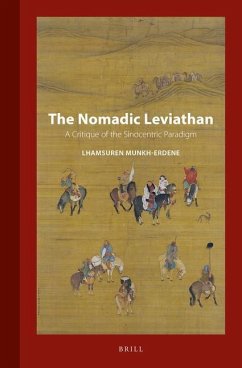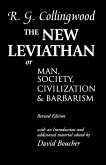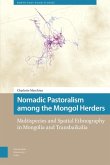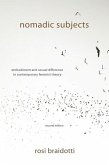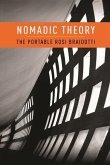- Gebundenes Buch
- Merkliste
- Auf die Merkliste
- Bewerten Bewerten
- Teilen
- Produkt teilen
- Produkterinnerung
- Produkterinnerung
Devised to legitimize the Republic of China's claim over Inner Asia, the Sinocentric paradigm stems from the Open Door Policy and Chinese nationalism. Advanced against the conquest theory, and rationalized as the pathfinding ecological theory, it is an evolutionary materialist scheme that became the vision of history. Exposing the initial agenda of this paradigm and revealing its fundamental contradictions, The Nomadic Leviathan debunks it as a myth. Resurrecting the conquest theory, and reinforcing it with the idea of extrahuman transportation, this book places pastoralism at the origin of…mehr
Andere Kunden interessierten sich auch für
![The New Leviathan The New Leviathan]() R. G. Collingwood (late Waynflete Professor of Metaphysical PhilosoThe New Leviathan79,99 €
R. G. Collingwood (late Waynflete Professor of Metaphysical PhilosoThe New Leviathan79,99 €![Nomadic Pastoralism among the Mongol Herders Nomadic Pastoralism among the Mongol Herders]() Charlotte MarchinaNomadic Pastoralism among the Mongol Herders123,99 €
Charlotte MarchinaNomadic Pastoralism among the Mongol Herders123,99 €![The Expanse 01. Leviathan Wakes The Expanse 01. Leviathan Wakes]() James S. A. CoreyThe Expanse 01. Leviathan Wakes10,99 €
James S. A. CoreyThe Expanse 01. Leviathan Wakes10,99 €![The Prince The Prince]() Niccolo MachiavelliThe Prince15,99 €
Niccolo MachiavelliThe Prince15,99 €![Nomadic Subjects Nomadic Subjects]() Rosi Braidotti (Utrecht Distinguished Professor in the HumanitiesNomadic Subjects34,99 €
Rosi Braidotti (Utrecht Distinguished Professor in the HumanitiesNomadic Subjects34,99 €![Nomadic Furniture Nomadic Furniture]() James HennesseyNomadic Furniture28,99 €
James HennesseyNomadic Furniture28,99 €![Nomadic Theory Nomadic Theory]() Rosi Braidotti (Utrecht Distinguished Professor in the HumanitiesNomadic Theory34,99 €
Rosi Braidotti (Utrecht Distinguished Professor in the HumanitiesNomadic Theory34,99 €-
-
-
Devised to legitimize the Republic of China's claim over Inner Asia, the Sinocentric paradigm stems from the Open Door Policy and Chinese nationalism. Advanced against the conquest theory, and rationalized as the pathfinding ecological theory, it is an evolutionary materialist scheme that became the vision of history.
Exposing the initial agenda of this paradigm and revealing its fundamental contradictions, The Nomadic Leviathan debunks it as a myth. Resurrecting the conquest theory, and reinforcing it with the idea of extrahuman transportation, this book places pastoralism at the origin of the state and civilization, and the Eurasian steppe at the center of human history; the political emerges as the primary and fundamental order defining the social and economic.
Hinweis: Dieser Artikel kann nur an eine deutsche Lieferadresse ausgeliefert werden.
Exposing the initial agenda of this paradigm and revealing its fundamental contradictions, The Nomadic Leviathan debunks it as a myth. Resurrecting the conquest theory, and reinforcing it with the idea of extrahuman transportation, this book places pastoralism at the origin of the state and civilization, and the Eurasian steppe at the center of human history; the political emerges as the primary and fundamental order defining the social and economic.
Hinweis: Dieser Artikel kann nur an eine deutsche Lieferadresse ausgeliefert werden.
Produktdetails
- Produktdetails
- Inner Asia Book Series 16
- Verlag: Brill
- Seitenzahl: 540
- Erscheinungstermin: 4. Mai 2023
- Englisch
- Abmessung: 235mm x 155mm
- Gewicht: 1022g
- ISBN-13: 9789004543881
- ISBN-10: 9004543880
- Artikelnr.: 67338454
- Herstellerkennzeichnung
- Libri GmbH
- Europaallee 1
- 36244 Bad Hersfeld
- 06621 890
- Inner Asia Book Series 16
- Verlag: Brill
- Seitenzahl: 540
- Erscheinungstermin: 4. Mai 2023
- Englisch
- Abmessung: 235mm x 155mm
- Gewicht: 1022g
- ISBN-13: 9789004543881
- ISBN-10: 9004543880
- Artikelnr.: 67338454
- Herstellerkennzeichnung
- Libri GmbH
- Europaallee 1
- 36244 Bad Hersfeld
- 06621 890
Lhamsuren Munkh-Erdene, Ph.D. (2004), Hokkaido University, is a Professor of History and Anthropology at the National University of Mongolia, and a visiting fellow at the Max Planck Institute for Social Anthropology. He is the author of The Taiji Government and the Rise of the Warrior State: The Formation of the Qing Imperial Constitution (Brill, 2021).
Foreword
Acknowledgments
Abbreviations
Introduction
0.1 The Aim, Scope, and Method
0.2 The Sinocentric Paradigm and the Great Anomaly
0.3 The Pseudo-Weberian Theory
0.4 The Origin of the Sinocentric Paradigm: Twisting Materialism and Redefining Evolution
0.5 A Retrospective Rationalization
0.6 The Nomadic Leviathan
0.7 The Organization of This Book
1 The Habit of Thought
1.1 Leviathan and Zomia: Environmental History
1.2 The Pan-Eurasian Pattern
1.3 The Origin of the Great Anomaly
1.4 The Chinese Empire and Its Northern Variant
1.5 The Sinocentric Paradigm: The Vision and the Division
2 The State before the Sinocentric Paradigm
2.1 The State: The Battle of the Idealistic and Materialistic Conceptions of History
2.2 The Conquest Theory and Its Materialistic Opponent
2.3 The Nomadic Conquest: The Political Means
2.4 The Weberian Separation: The State and the Political
2.5 The Rise of the State: The Charismatic Conquest
2.6 Legal Authority and Bureaucracy: The Rechtsstaat
3 Inner Asia before the Sinocentric Paradigm
3.1 The Theory of Nomadic Feudalism: The Ancient Military Feudal Regime
3.2 The Theory of Nomadic Civilization
3.3 The Theory of Inner Asian Empires over China
3.4 The Nomadic Political Order: Warlords and Warbands
4 The Sinocentric Scheme: Aim, Origins, and Theory
4.1 Integrating China and Its Inner Asian Hinterland
4.2 From Legal to Historical Fiction: The Chinese Empire
4.3 Peopling Inner Asia: The Creation of a Barbarian Plague
4.4 Redefining Evolution: The Environmental Theory of Political Organization
4.5 The Scheme: Evolutionary and Anti-evolutionary Societies
4.6 The Chinese Dynastic Cycle: Appropriating Inner Asian Empires
4.7 The Chinese Absorptive Empire: Domesticating Inner Asian Empires
4.8 The Cycle of Nomadic Political Power: Historical Geography Undermined
4.9 Rejecting Nomadic Feudalism: Redressing, Redefining, and Selecting
5 Kinship Turn and Evolutionary Schemes
5.1 The Triumph of the Sinocentric Scheme
5.2 African Political Systems: Administrative Pyramid and Kinship Segmentation
5.3 The Tatar State: Forging a Kinship Society and a Tribal-Consanguineal Polity
5.4 Resurrecting the Theory of Rod Organization
5.5 The Latest of the Conquest Theories: The Superstratification Thesis
5.6 Superstratifications over China: Nomadic Conquerors and Rulers
5.7 Evolutionary Anthropology and the Appropriation of the Weberian State
5.8 The Theory of Tribalism: The Validation of the Sinocentric Scheme
6 Beyond Evolutionary Materialism: The Military Pathway
6.1 Exhausting Evolutionary Materialism: Economic and Warfare Pathways
6.2 An Extreme Adaptive Strategy: The Military Feudal State
6.3 The Perilous Frontier: Predators, Scavengers, and Parasites
6.4 The Imperial Confederacy: Erasing Tribalism
6.5 Cycles of Power: The Pattern
7 The Sinocentric Paradigm in (Frontier) History
7.1 The Autocracy of Segmentary Opposition: Theory versus Sources
7.2 Building Imperial Autocracy: Defying Cultural Ecology
7.3 Developing Tanistry: Denying Dynastic Rulership
7.4 The Metamorphosis: Arguing for the Chinese Absorptive Empire
7.5 The Theory of Universal Rulership: Degrading the Great Khan
7.6 A Roman Insight: Defining Emperorship and Empire
8 The Nomadic Leviathan: Extrahuman Transportation and the Military Constitution
8.1 Debunking the Circumscription Theory
8.2 Extrahuman Transportation: Mobility, Nomadism, and Civilization
8.3 Pastoral Nomadism: Labor Efficiency and the Military Establishment
8.4 The State: Warband, City, and Tribe
8.5 The Nomadic Leviathan: The Military Constitution
9 The Tribal Inner Asia: Biblical Ethnology
9.1 Ordo: Courts and Cities
9.2 Inner Asian Tribal Society
9.3 The Mosaic Ethnology: Horde to Tribe
9.4 The Scientific Ethnology: The Leibnizian Paradigm
9.5 The Clash of the Political and Ethnological
References
Index
Acknowledgments
Abbreviations
Introduction
0.1 The Aim, Scope, and Method
0.2 The Sinocentric Paradigm and the Great Anomaly
0.3 The Pseudo-Weberian Theory
0.4 The Origin of the Sinocentric Paradigm: Twisting Materialism and Redefining Evolution
0.5 A Retrospective Rationalization
0.6 The Nomadic Leviathan
0.7 The Organization of This Book
1 The Habit of Thought
1.1 Leviathan and Zomia: Environmental History
1.2 The Pan-Eurasian Pattern
1.3 The Origin of the Great Anomaly
1.4 The Chinese Empire and Its Northern Variant
1.5 The Sinocentric Paradigm: The Vision and the Division
2 The State before the Sinocentric Paradigm
2.1 The State: The Battle of the Idealistic and Materialistic Conceptions of History
2.2 The Conquest Theory and Its Materialistic Opponent
2.3 The Nomadic Conquest: The Political Means
2.4 The Weberian Separation: The State and the Political
2.5 The Rise of the State: The Charismatic Conquest
2.6 Legal Authority and Bureaucracy: The Rechtsstaat
3 Inner Asia before the Sinocentric Paradigm
3.1 The Theory of Nomadic Feudalism: The Ancient Military Feudal Regime
3.2 The Theory of Nomadic Civilization
3.3 The Theory of Inner Asian Empires over China
3.4 The Nomadic Political Order: Warlords and Warbands
4 The Sinocentric Scheme: Aim, Origins, and Theory
4.1 Integrating China and Its Inner Asian Hinterland
4.2 From Legal to Historical Fiction: The Chinese Empire
4.3 Peopling Inner Asia: The Creation of a Barbarian Plague
4.4 Redefining Evolution: The Environmental Theory of Political Organization
4.5 The Scheme: Evolutionary and Anti-evolutionary Societies
4.6 The Chinese Dynastic Cycle: Appropriating Inner Asian Empires
4.7 The Chinese Absorptive Empire: Domesticating Inner Asian Empires
4.8 The Cycle of Nomadic Political Power: Historical Geography Undermined
4.9 Rejecting Nomadic Feudalism: Redressing, Redefining, and Selecting
5 Kinship Turn and Evolutionary Schemes
5.1 The Triumph of the Sinocentric Scheme
5.2 African Political Systems: Administrative Pyramid and Kinship Segmentation
5.3 The Tatar State: Forging a Kinship Society and a Tribal-Consanguineal Polity
5.4 Resurrecting the Theory of Rod Organization
5.5 The Latest of the Conquest Theories: The Superstratification Thesis
5.6 Superstratifications over China: Nomadic Conquerors and Rulers
5.7 Evolutionary Anthropology and the Appropriation of the Weberian State
5.8 The Theory of Tribalism: The Validation of the Sinocentric Scheme
6 Beyond Evolutionary Materialism: The Military Pathway
6.1 Exhausting Evolutionary Materialism: Economic and Warfare Pathways
6.2 An Extreme Adaptive Strategy: The Military Feudal State
6.3 The Perilous Frontier: Predators, Scavengers, and Parasites
6.4 The Imperial Confederacy: Erasing Tribalism
6.5 Cycles of Power: The Pattern
7 The Sinocentric Paradigm in (Frontier) History
7.1 The Autocracy of Segmentary Opposition: Theory versus Sources
7.2 Building Imperial Autocracy: Defying Cultural Ecology
7.3 Developing Tanistry: Denying Dynastic Rulership
7.4 The Metamorphosis: Arguing for the Chinese Absorptive Empire
7.5 The Theory of Universal Rulership: Degrading the Great Khan
7.6 A Roman Insight: Defining Emperorship and Empire
8 The Nomadic Leviathan: Extrahuman Transportation and the Military Constitution
8.1 Debunking the Circumscription Theory
8.2 Extrahuman Transportation: Mobility, Nomadism, and Civilization
8.3 Pastoral Nomadism: Labor Efficiency and the Military Establishment
8.4 The State: Warband, City, and Tribe
8.5 The Nomadic Leviathan: The Military Constitution
9 The Tribal Inner Asia: Biblical Ethnology
9.1 Ordo: Courts and Cities
9.2 Inner Asian Tribal Society
9.3 The Mosaic Ethnology: Horde to Tribe
9.4 The Scientific Ethnology: The Leibnizian Paradigm
9.5 The Clash of the Political and Ethnological
References
Index
Foreword
Acknowledgments
Abbreviations
Introduction
0.1 The Aim, Scope, and Method
0.2 The Sinocentric Paradigm and the Great Anomaly
0.3 The Pseudo-Weberian Theory
0.4 The Origin of the Sinocentric Paradigm: Twisting Materialism and Redefining Evolution
0.5 A Retrospective Rationalization
0.6 The Nomadic Leviathan
0.7 The Organization of This Book
1 The Habit of Thought
1.1 Leviathan and Zomia: Environmental History
1.2 The Pan-Eurasian Pattern
1.3 The Origin of the Great Anomaly
1.4 The Chinese Empire and Its Northern Variant
1.5 The Sinocentric Paradigm: The Vision and the Division
2 The State before the Sinocentric Paradigm
2.1 The State: The Battle of the Idealistic and Materialistic Conceptions of History
2.2 The Conquest Theory and Its Materialistic Opponent
2.3 The Nomadic Conquest: The Political Means
2.4 The Weberian Separation: The State and the Political
2.5 The Rise of the State: The Charismatic Conquest
2.6 Legal Authority and Bureaucracy: The Rechtsstaat
3 Inner Asia before the Sinocentric Paradigm
3.1 The Theory of Nomadic Feudalism: The Ancient Military Feudal Regime
3.2 The Theory of Nomadic Civilization
3.3 The Theory of Inner Asian Empires over China
3.4 The Nomadic Political Order: Warlords and Warbands
4 The Sinocentric Scheme: Aim, Origins, and Theory
4.1 Integrating China and Its Inner Asian Hinterland
4.2 From Legal to Historical Fiction: The Chinese Empire
4.3 Peopling Inner Asia: The Creation of a Barbarian Plague
4.4 Redefining Evolution: The Environmental Theory of Political Organization
4.5 The Scheme: Evolutionary and Anti-evolutionary Societies
4.6 The Chinese Dynastic Cycle: Appropriating Inner Asian Empires
4.7 The Chinese Absorptive Empire: Domesticating Inner Asian Empires
4.8 The Cycle of Nomadic Political Power: Historical Geography Undermined
4.9 Rejecting Nomadic Feudalism: Redressing, Redefining, and Selecting
5 Kinship Turn and Evolutionary Schemes
5.1 The Triumph of the Sinocentric Scheme
5.2 African Political Systems: Administrative Pyramid and Kinship Segmentation
5.3 The Tatar State: Forging a Kinship Society and a Tribal-Consanguineal Polity
5.4 Resurrecting the Theory of Rod Organization
5.5 The Latest of the Conquest Theories: The Superstratification Thesis
5.6 Superstratifications over China: Nomadic Conquerors and Rulers
5.7 Evolutionary Anthropology and the Appropriation of the Weberian State
5.8 The Theory of Tribalism: The Validation of the Sinocentric Scheme
6 Beyond Evolutionary Materialism: The Military Pathway
6.1 Exhausting Evolutionary Materialism: Economic and Warfare Pathways
6.2 An Extreme Adaptive Strategy: The Military Feudal State
6.3 The Perilous Frontier: Predators, Scavengers, and Parasites
6.4 The Imperial Confederacy: Erasing Tribalism
6.5 Cycles of Power: The Pattern
7 The Sinocentric Paradigm in (Frontier) History
7.1 The Autocracy of Segmentary Opposition: Theory versus Sources
7.2 Building Imperial Autocracy: Defying Cultural Ecology
7.3 Developing Tanistry: Denying Dynastic Rulership
7.4 The Metamorphosis: Arguing for the Chinese Absorptive Empire
7.5 The Theory of Universal Rulership: Degrading the Great Khan
7.6 A Roman Insight: Defining Emperorship and Empire
8 The Nomadic Leviathan: Extrahuman Transportation and the Military Constitution
8.1 Debunking the Circumscription Theory
8.2 Extrahuman Transportation: Mobility, Nomadism, and Civilization
8.3 Pastoral Nomadism: Labor Efficiency and the Military Establishment
8.4 The State: Warband, City, and Tribe
8.5 The Nomadic Leviathan: The Military Constitution
9 The Tribal Inner Asia: Biblical Ethnology
9.1 Ordo: Courts and Cities
9.2 Inner Asian Tribal Society
9.3 The Mosaic Ethnology: Horde to Tribe
9.4 The Scientific Ethnology: The Leibnizian Paradigm
9.5 The Clash of the Political and Ethnological
References
Index
Acknowledgments
Abbreviations
Introduction
0.1 The Aim, Scope, and Method
0.2 The Sinocentric Paradigm and the Great Anomaly
0.3 The Pseudo-Weberian Theory
0.4 The Origin of the Sinocentric Paradigm: Twisting Materialism and Redefining Evolution
0.5 A Retrospective Rationalization
0.6 The Nomadic Leviathan
0.7 The Organization of This Book
1 The Habit of Thought
1.1 Leviathan and Zomia: Environmental History
1.2 The Pan-Eurasian Pattern
1.3 The Origin of the Great Anomaly
1.4 The Chinese Empire and Its Northern Variant
1.5 The Sinocentric Paradigm: The Vision and the Division
2 The State before the Sinocentric Paradigm
2.1 The State: The Battle of the Idealistic and Materialistic Conceptions of History
2.2 The Conquest Theory and Its Materialistic Opponent
2.3 The Nomadic Conquest: The Political Means
2.4 The Weberian Separation: The State and the Political
2.5 The Rise of the State: The Charismatic Conquest
2.6 Legal Authority and Bureaucracy: The Rechtsstaat
3 Inner Asia before the Sinocentric Paradigm
3.1 The Theory of Nomadic Feudalism: The Ancient Military Feudal Regime
3.2 The Theory of Nomadic Civilization
3.3 The Theory of Inner Asian Empires over China
3.4 The Nomadic Political Order: Warlords and Warbands
4 The Sinocentric Scheme: Aim, Origins, and Theory
4.1 Integrating China and Its Inner Asian Hinterland
4.2 From Legal to Historical Fiction: The Chinese Empire
4.3 Peopling Inner Asia: The Creation of a Barbarian Plague
4.4 Redefining Evolution: The Environmental Theory of Political Organization
4.5 The Scheme: Evolutionary and Anti-evolutionary Societies
4.6 The Chinese Dynastic Cycle: Appropriating Inner Asian Empires
4.7 The Chinese Absorptive Empire: Domesticating Inner Asian Empires
4.8 The Cycle of Nomadic Political Power: Historical Geography Undermined
4.9 Rejecting Nomadic Feudalism: Redressing, Redefining, and Selecting
5 Kinship Turn and Evolutionary Schemes
5.1 The Triumph of the Sinocentric Scheme
5.2 African Political Systems: Administrative Pyramid and Kinship Segmentation
5.3 The Tatar State: Forging a Kinship Society and a Tribal-Consanguineal Polity
5.4 Resurrecting the Theory of Rod Organization
5.5 The Latest of the Conquest Theories: The Superstratification Thesis
5.6 Superstratifications over China: Nomadic Conquerors and Rulers
5.7 Evolutionary Anthropology and the Appropriation of the Weberian State
5.8 The Theory of Tribalism: The Validation of the Sinocentric Scheme
6 Beyond Evolutionary Materialism: The Military Pathway
6.1 Exhausting Evolutionary Materialism: Economic and Warfare Pathways
6.2 An Extreme Adaptive Strategy: The Military Feudal State
6.3 The Perilous Frontier: Predators, Scavengers, and Parasites
6.4 The Imperial Confederacy: Erasing Tribalism
6.5 Cycles of Power: The Pattern
7 The Sinocentric Paradigm in (Frontier) History
7.1 The Autocracy of Segmentary Opposition: Theory versus Sources
7.2 Building Imperial Autocracy: Defying Cultural Ecology
7.3 Developing Tanistry: Denying Dynastic Rulership
7.4 The Metamorphosis: Arguing for the Chinese Absorptive Empire
7.5 The Theory of Universal Rulership: Degrading the Great Khan
7.6 A Roman Insight: Defining Emperorship and Empire
8 The Nomadic Leviathan: Extrahuman Transportation and the Military Constitution
8.1 Debunking the Circumscription Theory
8.2 Extrahuman Transportation: Mobility, Nomadism, and Civilization
8.3 Pastoral Nomadism: Labor Efficiency and the Military Establishment
8.4 The State: Warband, City, and Tribe
8.5 The Nomadic Leviathan: The Military Constitution
9 The Tribal Inner Asia: Biblical Ethnology
9.1 Ordo: Courts and Cities
9.2 Inner Asian Tribal Society
9.3 The Mosaic Ethnology: Horde to Tribe
9.4 The Scientific Ethnology: The Leibnizian Paradigm
9.5 The Clash of the Political and Ethnological
References
Index

